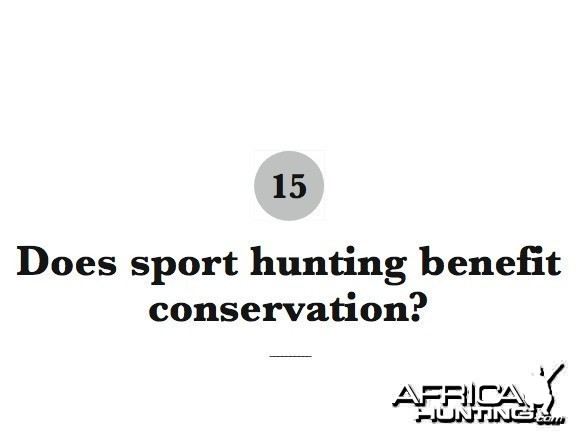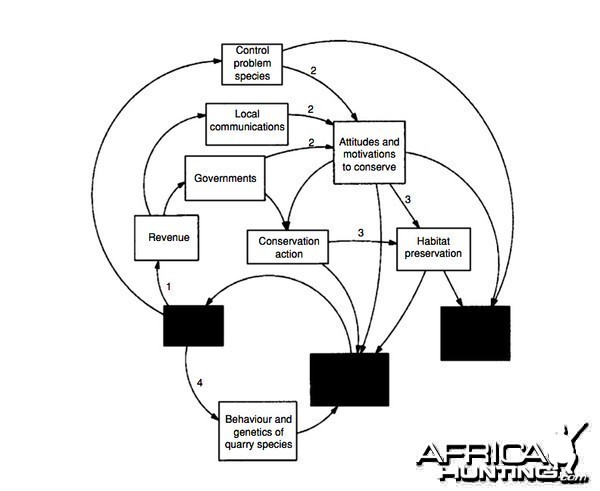- Joined
- Oct 1, 2007
- Messages
- 13,082
- Reaction score
- 9,180
- Website
- www.africahunting.com
- Media
- 5,597
- Articles
- 321
Does Sport Hunting Benefit Conservation?
by Andrew J. Loveridge, Jonathan C. Reynolds & E. J. Milner-Gulland

Download the entire article at View attachment 2761.
There is a passion for hunting deeply implanted within the human breast...
(Charles Dickens, Oliver Twist, 1837–8)
Introduction
When a wildlife population is threatened, deliberately killing individuals from it may seem perverse. Yet some argue that, paradoxically, well-regulated sport hunting benefits wildlife populations, and may sometimes be the only way to ensure their persistence. In this essay we consider whether this assertion is supported by experience.
When poorly regulated, hunting can be – and historically often has been – damaging to the target population, with dramatic examples of extinction and population decline (Roth & Merz 1996). Even in the 1980s, hunting contributed to drastic reductions in populations of the dorcas gazelle (Gazella dorcas) and to extermination of the Nubian bustard (Neotis nuba) from Sahelian Africa (Newby 1990). The tally of millions of migratory birds shot and trapped annually by Mediterranean hunters has alarmed observers and caused them to question its sustainability (Lindell & Wirdheim 2001). However, the impact of hunting on population dynamics can be complex and difficult to quantify. For example, although there has been much concern about the
impact of hunting on migratory turtle doves (Streptopelia turtur), Browne & Aebischer (2004) found that the observed decline in UK breeding turtle doves could be entirely explained by changed UK farming practices
with no direct evidence for a damaging impact of hunting. There are many examples all over the world where hunting has been regulated successfully (Tapper & Reynolds 1996). The wild turkey (Meleagris gallopavo; Dickson 1992), white-tailed deer (Odocoileus virginianus; Woolf & Roseberry 1998) and beaver (Castor canadensis; Novak 1987) in North America are all species whose fortunes have been dramatically improved by a programme of conservation measures that includes sub- stantial regulated harvests.
Sport hunting and nature conservation have both been part of human culture from the earliest times. For example, Ancient Egypt had a strong tradition of sport hunting (Osborn & Osbornova 1998). Bogdkhan Mountain Reserve, Mongolia, was formally protected in 1778, but informal prohibitions on hunting and logging on this sacred site date from the thirteenth century (United Nations Mongolia Office 2004). Other similar examples include the Royal Chitwan National Park in Nepal and the New Forest in the UK. However, the roots of contemporary conservation are usually traced back to nineteenth century colonial sport hunting (Adams 2004). Pressure from hunters, alarmed at unregulated destruction of game habitats and populations, led to the establishment of parks and reserves in the British colonies and the USA (Fitter & Scott 1978; Adams 2004). Many of these were initially set aside as hunting grounds, and many national parks services and government conservation departments have origins in agencies established to defend hunting reserves and suppress poaching (Adams & Hulme 2001). This purely preservationist view of conservation has given way to a perspective that is more inclusive of humans (Duffy 2000; Hutton & Leader-Williams 2003; Jones & Murphree 2004). Modern conservation is about reducing extinction risks, maintaining essential ecological processes, preserving genetic diversity and ensuring that the use of species and ecosystems is sustainable (Convention on Biological Diversity 2003). Although this definition does not positively promote use as a conservation tool, the explicit inclusion of sustainable use is a recognition that human use of wildlife happens, and that the appropriate role of conservation is to ensure that it is sustainable, rather than to prohibit it. Sport hunting is a multifaceted activity, occurring in many ecological and socio-political landscapes, variously motivated and generating a range of revenues. A single characterization of its impact on conservation is necessarily simplistic. We begin by clarifying what we mean by sport hunting, and discussing the ethical issues that bedevil the debate on its role in conservation. We then address the key issues summarized in Fig. 15.1.

Fig. 15.1 Illustrating the relationship between sport-hunting and conservation discussed in this essay. The
numbering corresponds to the key questions addressed in the main text.
1 We ask whether or not hunting raises
revenue, and if so whether this revenue
can be used to benefit conservation?
2 One important issue is whether or not revenue earned from hunting offsets the opportunity costs of not engaging in other activities, especially in the case of poor communities living in areas of rich biodiversity.
3 We explore whether hunting affects the conservation of habitat and biodiversity.
4 We explore whether there are any subtle side-effects affecting hunted populations.
Download the entire article at View attachment 2761.
by Andrew J. Loveridge, Jonathan C. Reynolds & E. J. Milner-Gulland
Download the entire article at View attachment 2761.
There is a passion for hunting deeply implanted within the human breast...
(Charles Dickens, Oliver Twist, 1837–8)
Introduction
When a wildlife population is threatened, deliberately killing individuals from it may seem perverse. Yet some argue that, paradoxically, well-regulated sport hunting benefits wildlife populations, and may sometimes be the only way to ensure their persistence. In this essay we consider whether this assertion is supported by experience.
When poorly regulated, hunting can be – and historically often has been – damaging to the target population, with dramatic examples of extinction and population decline (Roth & Merz 1996). Even in the 1980s, hunting contributed to drastic reductions in populations of the dorcas gazelle (Gazella dorcas) and to extermination of the Nubian bustard (Neotis nuba) from Sahelian Africa (Newby 1990). The tally of millions of migratory birds shot and trapped annually by Mediterranean hunters has alarmed observers and caused them to question its sustainability (Lindell & Wirdheim 2001). However, the impact of hunting on population dynamics can be complex and difficult to quantify. For example, although there has been much concern about the
impact of hunting on migratory turtle doves (Streptopelia turtur), Browne & Aebischer (2004) found that the observed decline in UK breeding turtle doves could be entirely explained by changed UK farming practices
with no direct evidence for a damaging impact of hunting. There are many examples all over the world where hunting has been regulated successfully (Tapper & Reynolds 1996). The wild turkey (Meleagris gallopavo; Dickson 1992), white-tailed deer (Odocoileus virginianus; Woolf & Roseberry 1998) and beaver (Castor canadensis; Novak 1987) in North America are all species whose fortunes have been dramatically improved by a programme of conservation measures that includes sub- stantial regulated harvests.
Sport hunting and nature conservation have both been part of human culture from the earliest times. For example, Ancient Egypt had a strong tradition of sport hunting (Osborn & Osbornova 1998). Bogdkhan Mountain Reserve, Mongolia, was formally protected in 1778, but informal prohibitions on hunting and logging on this sacred site date from the thirteenth century (United Nations Mongolia Office 2004). Other similar examples include the Royal Chitwan National Park in Nepal and the New Forest in the UK. However, the roots of contemporary conservation are usually traced back to nineteenth century colonial sport hunting (Adams 2004). Pressure from hunters, alarmed at unregulated destruction of game habitats and populations, led to the establishment of parks and reserves in the British colonies and the USA (Fitter & Scott 1978; Adams 2004). Many of these were initially set aside as hunting grounds, and many national parks services and government conservation departments have origins in agencies established to defend hunting reserves and suppress poaching (Adams & Hulme 2001). This purely preservationist view of conservation has given way to a perspective that is more inclusive of humans (Duffy 2000; Hutton & Leader-Williams 2003; Jones & Murphree 2004). Modern conservation is about reducing extinction risks, maintaining essential ecological processes, preserving genetic diversity and ensuring that the use of species and ecosystems is sustainable (Convention on Biological Diversity 2003). Although this definition does not positively promote use as a conservation tool, the explicit inclusion of sustainable use is a recognition that human use of wildlife happens, and that the appropriate role of conservation is to ensure that it is sustainable, rather than to prohibit it. Sport hunting is a multifaceted activity, occurring in many ecological and socio-political landscapes, variously motivated and generating a range of revenues. A single characterization of its impact on conservation is necessarily simplistic. We begin by clarifying what we mean by sport hunting, and discussing the ethical issues that bedevil the debate on its role in conservation. We then address the key issues summarized in Fig. 15.1.
Fig. 15.1 Illustrating the relationship between sport-hunting and conservation discussed in this essay. The
numbering corresponds to the key questions addressed in the main text.
1 We ask whether or not hunting raises
revenue, and if so whether this revenue
can be used to benefit conservation?
2 One important issue is whether or not revenue earned from hunting offsets the opportunity costs of not engaging in other activities, especially in the case of poor communities living in areas of rich biodiversity.
3 We explore whether hunting affects the conservation of habitat and biodiversity.
4 We explore whether there are any subtle side-effects affecting hunted populations.
Download the entire article at View attachment 2761.
Last edited by a moderator:

